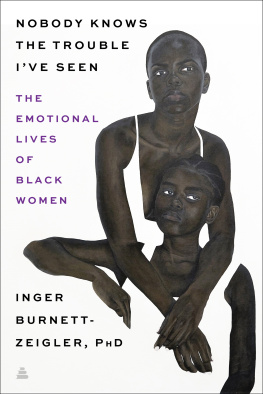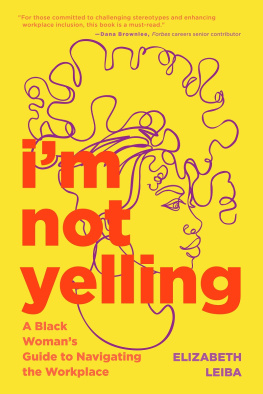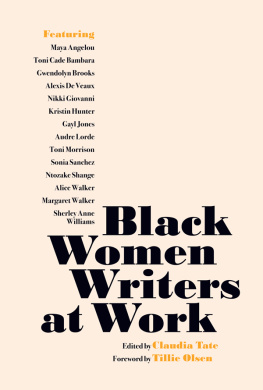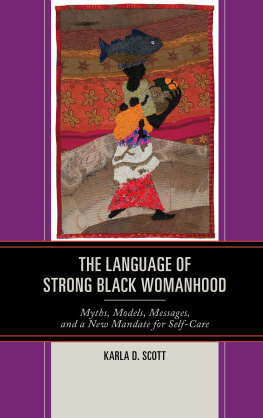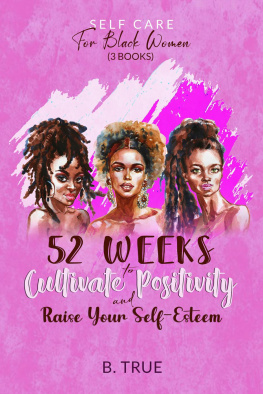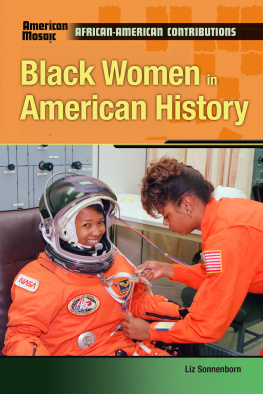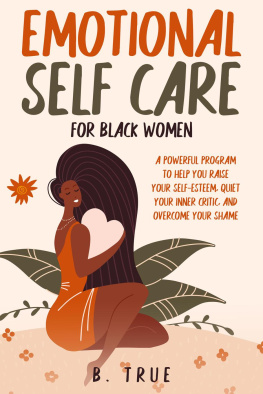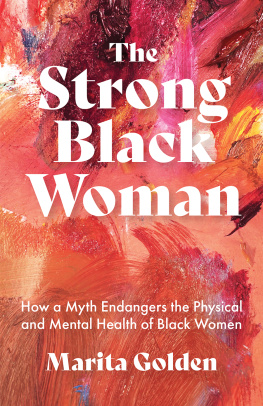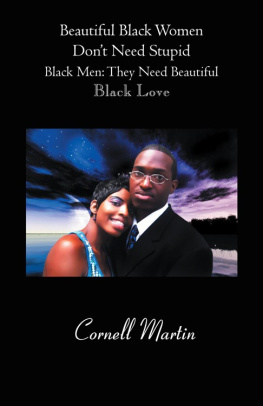Contents
Guide
To my mom,
for your strength and vulnerability,
lifetime of sacrifice,
and abundant love.
Usually when people talk about the strength of black women they are referring to the way in which they perceive black women coping with oppression. They ignore the reality that to be strong in the face of oppression is not the same as overcoming oppression, that endurance is not to be confused with transformation.
bell hooks, aint i a woman
Contents
Everywhere that we turn, were surrounded by beautiful, intelligent, strong Black women. Im sure that you can name many in your own life. In fact, youre probably one of them. Todays strong Black women are grinding at work and climbing professional ladders, at every event, hair laid, nails done, dressed to perfection and nowhere is a trace of trouble to be found. They are sitting next to you at church, volunteering at community events, and at your book or wine club. They are doing whatever they need to do to take care of their children and extended family, with or without the help of a partner. They are working multiple jobs, trying to make it in a system designed to prevent them from getting ahead. Strong Black women are not just the backbone of society, they are its breath and its heartbeat.
The strong Black woman can be seen on big and small screens or one click away on social media. Political leaders like Shirley Chisholm, Auntie Maxine, and Michelle Obama; literary icons like Gwendolyn Brooks, Octavia Butler, and Toni Morrison; athletic champions like Althea Gibson and Serena Williams; dynamic actresses like Cicely Tyson, Angela Bassett, and Regina King; and TV moms like Georgia Evans and Clair Huxtable. Crooners who sang such as Aretha Franklin, Nina Simone, and Mary J. Blige. And, representing business leaders, Ursula M. Burns, Debra Lee, and Mellody Hobson. They are also those in our own families whose names may be lesser known, like my grandmother and mother, my first strong Black women examples; the women who mentor me at work; and, of course, my girlfriends.
From a distance, strong Black women seem invincible. Everything they set out to accomplish, they achieve. They bounce back stronger from whatever threatens to get in their way. Their head is always held up high, with style and a smile. If you step out of line and need to be put back in your place, they can do that too. Above all, they never forget to give praise and honor to God for all that he has done for them. We look up to these women as our role models and for inspiration. Their strength makes us believe that the possibilities available to us are limitless.
But, as strong Black women, you know best that it isnt always easy to be strong. The world is out here testing us every day, be it at home, work, or just walking down the street. My grandmother taught my mother, and my mother taught me, to deal with hurt, disappointment, and loss by wiping my tears away, keeping my head up and keeping going. It aint the first time youve been hurt and it wont be the last, she would say. My mother reminded me early and often, Life aint fair, so dont expect it to be.
Society puts pressure on us to be everything to everybodyto be superwomenand we accept the charge. We are constantly pouring out and rarely allow ourselves to receive the care we so urgently need. We fight tooth and nail to defy the negative expectations people have of us and to prove our worth. And yet, it seems like its never enough.
In spite of our difficult circumstances, Black women are masters at maintaining a cool indifference and presenting ourselves as having it all together. As soon as we step out of the house, we put our game face onour mask. This mask is our protection from all of the historical trauma and societal illsracism, sexism, victimizationthat weigh us down. It tries to keep the outside hurt from getting in and the inside hurt from getting out.
Often the mask is a faade and doesnt really reflect what weve been through or how were feeling. Although we generally accept the label of strong Black woman with pride, on the other side of the mask are stress, anxiety, and depression that lead to unhealthy behaviors such as emotional eating, poor sleep, and neglecting self-care. The mask allows us to show only a fraction of our true selves to the world. We wear it as a way of coping with our pain. Its our survival tactic. But is it really serving us? I dont think so. In fact, I believe the strong Black woman mask is preventing us from being our authentic and abundant selves.
When all forms of suffering are considered, its hard to find a Black woman who hasnt experienced some form of trauma. Yet if you dont look closely, or ask the right questions, you would look right past them. Black women have been pushing through and going through the motions for so long that suffering has become the norm. Far too often we have coped with our pain by turning away from it, avoiding or denying it rather than looking at it closely and handling it tenderly.
Nobody Knows the Trouble Ive Seen is about strong Black women, the unknown suffering that is intimately embedded in their strength. It is a guidebook for healing. In this book I will show you how to move past the faade of the strong Black woman and embrace who you really arewarm and supportive, audacious, and joyous.
The woman who is too strong lives a life in which she doesnt acknowledge all of the emotions that are a part of a normal human experience. The woman who is too vulnerable may be less equipped to cope in todays society, where systematic oppression and racial and gender discrimination are rampant. Here, I will outline how Black women can create a healthy balance between strength and vulnerability.
Long before I ever started trying to understand the circumstances that shape the lives of others, I observed and analyzed what was happening within my own household. Early on I realized that my mother and grandmother were only revealing a fraction of themselves to the outside world. They made it clear that not all things are granted permission to be openly discussed, and emotions are complex and at times may feel contradictory. By middle school Id determined that my family was dysfunctional and suggested to my parents that we go to therapy, a novel idea for a little Black girl living on the South Side of Chicago. I wanted to fix us. I wanted our family to be normal.
My mothers response was to ignore it. What do you think we need therapy for? she asked with genuine confusion. My dad chuckled with amusement, attempting to assure me, Were fine. And, they both went on: We arent the kind of people who go to therapy. This was some mess that you must have picked up from the white kids at school. They were right.
I attended a liberal and racially diverse elementary school. When the kids at my school had a problem, the entire family sat around in a circle and talked to a kind and understanding person who listened carefully and helped them to work it out. At least thats how I imagined it to be. Those white kids seemed happy and well adjusted.
Instead of talking about our problems, I learned how to pretend that everything was normal and to keep my thoughts and feelings to myself. This behavior worked temporarily, until eventually all of the emotions that I had been suppressing came rising to the surface. Its also the reason I decided to write Nobody Knows the Trouble Ive Seen, because I know that suppressing how you feel doesnt make the feelings, or the problems, go away.
As a clinical psychologist, I bring together a lifetime of observing, listening to, and learning from strong Black women, decades of scholarly research that has been conducted on their mental and physical health, and experience providing mental health treatment. I also offer you my lived experiences as a Black woman who has struggled with depression and anxiety.

